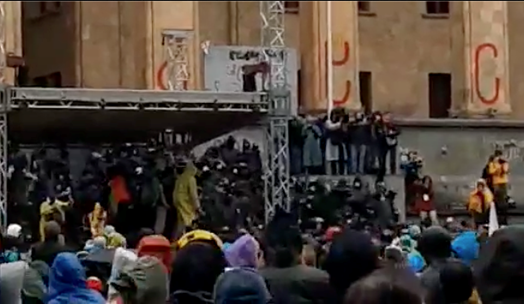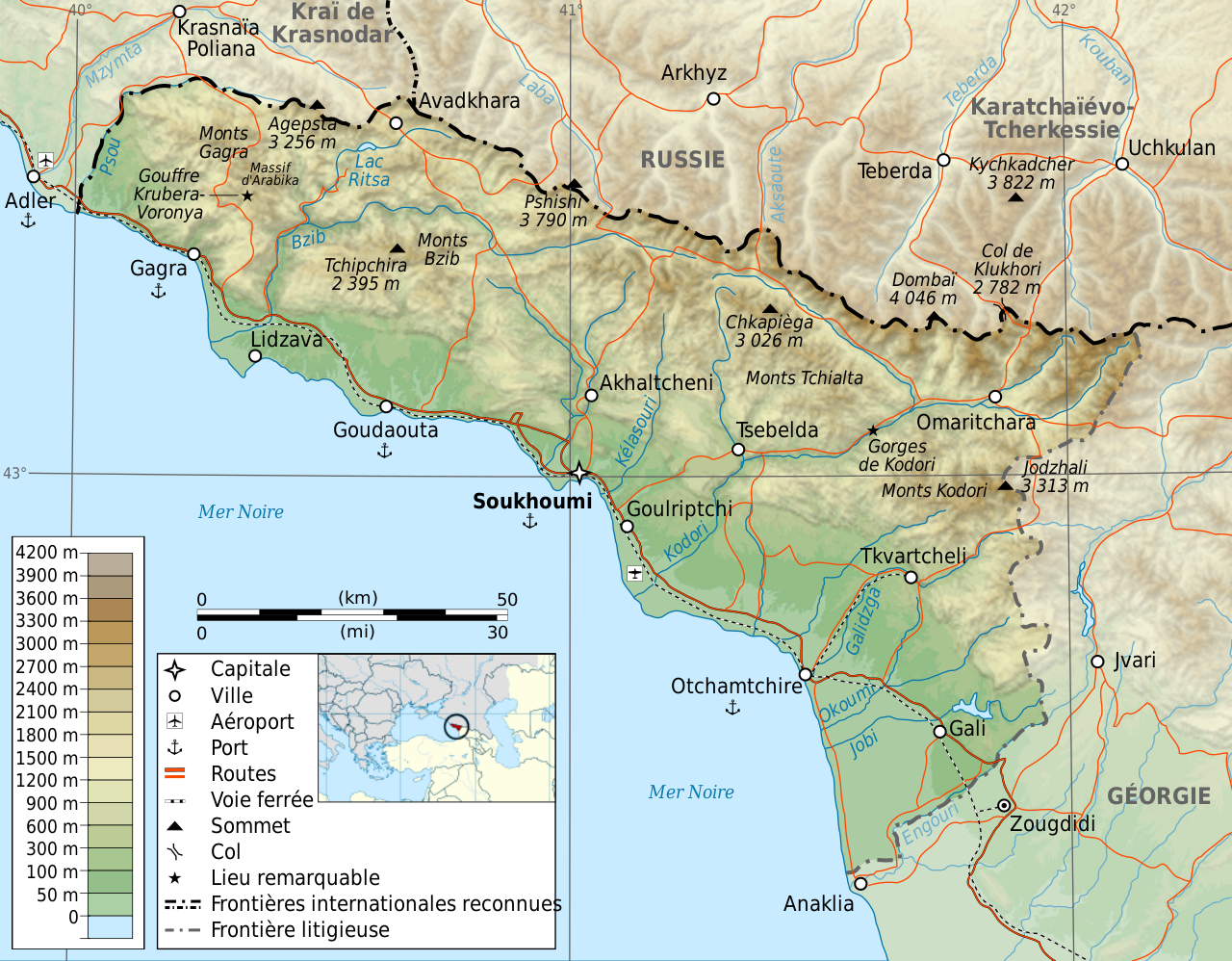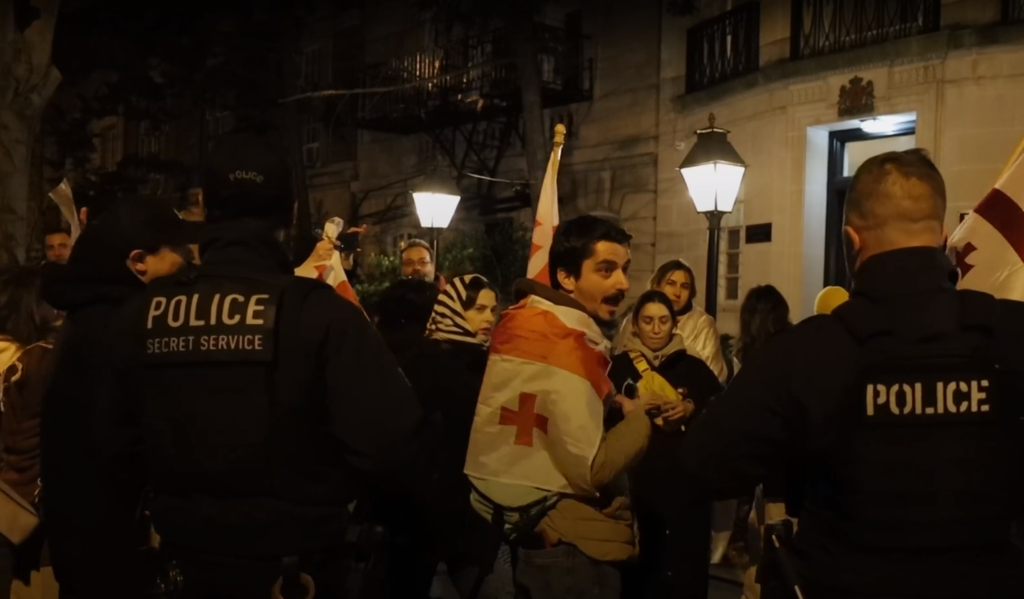
Video still frame of Georgian demonstrators in front of Parliament building in Tbilisi protesting Foreign Agents law, May 2024.
“The proposed Russia law, … requires all non-governmental groups and media organizations to disclose foreign funding/influence.”
Georgia has been rocked by waves of protests and counter-protests triggered by the re-introduction of a “foreign agents law,” the so-called “Russia law” in parliament by the Georgian Dream party. The legislation, similar to a law passed in Russia and currently in debate in Georgia’s breakaway region of Abkhazia,[i] requires all non-governmental groups and media organizations to disclose foreign funding and influence, thus leading to its name of the “foreign agents law.” According to the excerpted article and interview published in Austrian-based IGlobenews, Georgian Parliamentarian Armaz Akhvlediani,[ii] addressed the history behind the controversial bill as well as how it will impact Georgia’s aspirations to be accepted into the EU. The article notes that “Georgian Dream still supports Georgia’s European Union and NATO membership, but has taken a pro-Russian attitude,” at least for the time being. “They do not want the conflict in Ukraine spreading to Georgia.” Akhvlediani notes however, that the governance style of the “Georgian Dream” administration excludes democratization and European integration and that “the victory of Ukraine in the war and its accession to the European Union are of fundamental importance to Georgians.” The foreign agents law will certainly impact the operational environment in Georgia. The United States has been involved in Georgia for decades to include military training partnerships and weapons transfers. While it isn’t yet clear what the impact will be, the foreign agents law will likely have a restraining effect on the military and security cooperation between Georgia and the United States and its western partners.
Sources:
Diana Mautner Markhof, “Exclusive iGlobenews Interview with Georgian Parliamentarian Armaz Akhvlediani,” IGlobenews (Austria-based non-profit news platform created by graduates of Diplomatische Akademie Wien), 8 May 2024. https://www.iglobenews.org/interview-with-armaz-akhvlediani/
The proposed Russia law, … requires all non-governmental groups and media organizations to disclose foreign funding/influence. Georgian Parliamentarian Armaz Akhvlediani …supports the protests, is strongly anti-Russian and believes the EU/US will fill any void once Russia pulls its considerable influence from Georgia.
Opponents of the bill, believe it will be used to crack down on those not in line with the governing party’s pro-Russian stance. This law, say its critics, will be a roadblock on Georgia’s road to EU membership.
Georgian Dream [political party] still supports Georgia’s European Union and NATO membership, but has taken a pro-Russian attitude. They do not want the conflict in Ukraine spreading to Georgia. The Georgia government gathered its own supporters in the tens of thousands to counter-protest in front of Georgia’s parliament in Tbilisi on 29 April. Georgia has learned the lessons of Ukraine’s color revolution and will likely not back down nor relinquish the streets to the opposition.
Armaz Akhvlediani: Achieving candidate member status is the result of a long-term, tireless struggle for the democratic and European values of the Georgian people. The ruling party, led by oligarch Ivanishvili, then and now fiercely opposes this process, flagrantly violating the country’s constitution, which recognizes the European integration of Georgia as a priority. The governance style of the “Georgian Dream” administration excludes democratization and European integration. Through violence and moral terror, the party led by Ivanishvili aims solely to maintain power. However, most Georgian citizens strongly oppose this and strive to protect Georgia’s Euro-Atlantic choice. The victory of Ukraine in the war and its accession to the European Union are of fundamental importance to Georgians.
Armaz Akhvlediani: The revival of the Putinist law on agents of foreign influence makes joining the European Union virtually impossible. This law, previously withdrawn by the ruling party under public pressure and promises not to revisit the issue, resurfaces, posing a threat to critical NGOs and media outlets akin to Putin’s methods. Despite widespread protests by hundreds of thousands of Georgian citizens and daily calls from Western partners urging the “Georgian Dream” to abandon this initiative, Ivanishvili’s party obstinately persists in obstructing the country’s path toward European integration and democratization.
Notes:
[i] Abkhazia is a de-facto independent state having broken free from Georgia by war in the Fall of 1993. It maintains its own government and armed forces while hosting Russian troops. Russia and only four other nations recognize Abkhazia’s independence. Foreign funded NGOs have been very important to Abkhazia such as The HALO Trust, a Europe based de-mining organization that has spent decades in Abkhazia clearing mines left over from the Georgia-Abkhazia War 1992-1993.
[ii] Armaz Akhvlediani is currently serving his third term in Georgia’s Parliament. He is member of Georgia’s Parliamentary Committee on Defense and Security and of its Ethics Council. He is the Founder and Director of the Tbilisi School of Political Studies.
Image Information:
Image: Video still frame of Georgian demonstrators in front of Parliament building in Tbilisi protesting Foreign Agents law, May 2024.
Source: Vakhtang Maisaia
Attribution: By author’s permission


